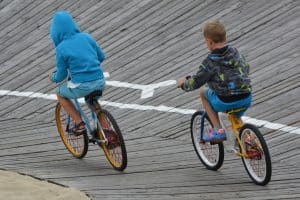Learner-Centered Tip of the Week: Readiness Levels
CompetencyWorks Blog
 This post originally appeared on Courtney Belolan’s website on September 21, 2015. Belolan is the instructional coach for RSU2 in Maine.
This post originally appeared on Courtney Belolan’s website on September 21, 2015. Belolan is the instructional coach for RSU2 in Maine.
One of the biggest concerns about proficiency based, and learner centered instruction, centers around the idea of “students working at their own pace.” Education community members wonder: what about deadlines? what if a student’s pace is “do nothing?” who will teach them if the just keep going ahead? what happens if a kid finishes all the standards by the time they are 16? The questions go on, and on. Most of them are completely valid questions, and worth conversations about. A good place to start is to examine how the idea of a student’s own pace.
Instead of thinking of the word “pace” think of “readiness level.” A student’s readiness level is the point where they have the ability to be successful with whatever the current learning is, and stretch a bit into new understanding and skills with the support of a teacher. Readiness level is the same thing as the Zone of Proximal Development. So now, think about this new statement:
In a learner centered system, students work at their readiness level.
This changes the picture a bit. There is still room in this vision for a teacher to teach, for there to be deadlines, for students to learn at a degree and depth that makes sense for them, for a class to all be studying the same topic at different complexity levels. A student’s readiness level can be used to match instruction and expected independence for any kind of procedural or declarative knowledge, including planning, organization and other soft skills.
But what about pace? The amount of time it takes, or should take, a student to complete and show mastery of learning is still important. Our students should know what a good pace is, and what to do if they get behind or ahead. Setting a pace for students includes setting due dates and otherwise supporting the development of those work habits.
See also:
- Never The First to Finish: Why Pace Matters
- Lingering Questions #1: Pacing and Supports
- Competency Education Can Address Readiness Gaps—But Not Alone
Courtney Belolan works at RSU 2 in Maine where she supports K-12 teachers with performance-based, individualized learning. Courtney works closely with teams and teachers as a coach, and with the school and district leadership teams as an instructional strategist. Courtney has worked as a 6-12 literacy and instructional coach, a middle level ELA teacher, an environmental educator, and a digital literacy coach. Her core beliefs include the idea that the best education is one centered on student passions and rooted in interdisciplinary applications, and that enjoying learning is just as important as the learning itself.